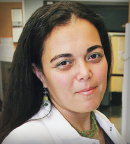There are currently more than 3.8 million breast cancer survivors living in the United States, and 3 out of 10 women with invasive breast cancer will develop metastases. However, if some breast cancer cells remain after treatment, the amount is often too small to be detected by mammograms or ultrasounds, although they pose a significant risk.
To address this challenge, the University of Southern California (USC) Norris Comprehensive Cancer Center at Keck Medicine of USC is launching a new initiative: The Eileen McGeever Breast Cancer Survivorship Program. Led by USC Norris scientists and clinicians Bodour Salhia, PhD; Irene Kang, MD; and Caryn Lerman, PhD, this new program is developing a novel blood test to detect the presence of micrometastatic residual breast cancer at the end of therapy and creating a recurrence risk classifier that also incorporates additional clinical, environmental, and lifestyle risk factors.

Bodour Salhia, PhD

Irene Kang, MD

Caryn Lerman, PhD
“Approximately 90% of breast cancer deaths are due to metastasis,” said Dr. Lerman, Director of the USC Norris Comprehensive Cancer Center, Associate Dean for Cancer Programs, and the H. Leslie and Elaine S. Hoffman Chair in Cancer Research at the Keck School of Medicine. “The multiethnic Breast Cancer Survivorship Program at USC Norris will develop the vital tools and resources needed to detect residual disease before it spreads to other organs, when the cancer may be more treatable, giving the patients a better chance at survival.”
Liquid Biopsy
Integrating research and survivorship care, the Breast Cancer Survivorship Program will further the development of a potential liquid biopsy—a blood-based test for detecting circulating tumor DNA—that could spur cancer’s recurrence and spread. Using next-generation sequencing and artificial intelligence, the research team will validate this blood test in a cohort of 1,000 women. With the assistance of the USC Norris Population Research Core and the USC Norris Data Science Core, the multiethnic program will leverage artificial intelligence and machine learning approaches to incorporate environmental exposures, neighborhood data, and social determinants of health. This recurrence risk classifier will be used to develop an artificial intelligence–based tool for determining a breast cancer survivor’s risk of recurrence.

